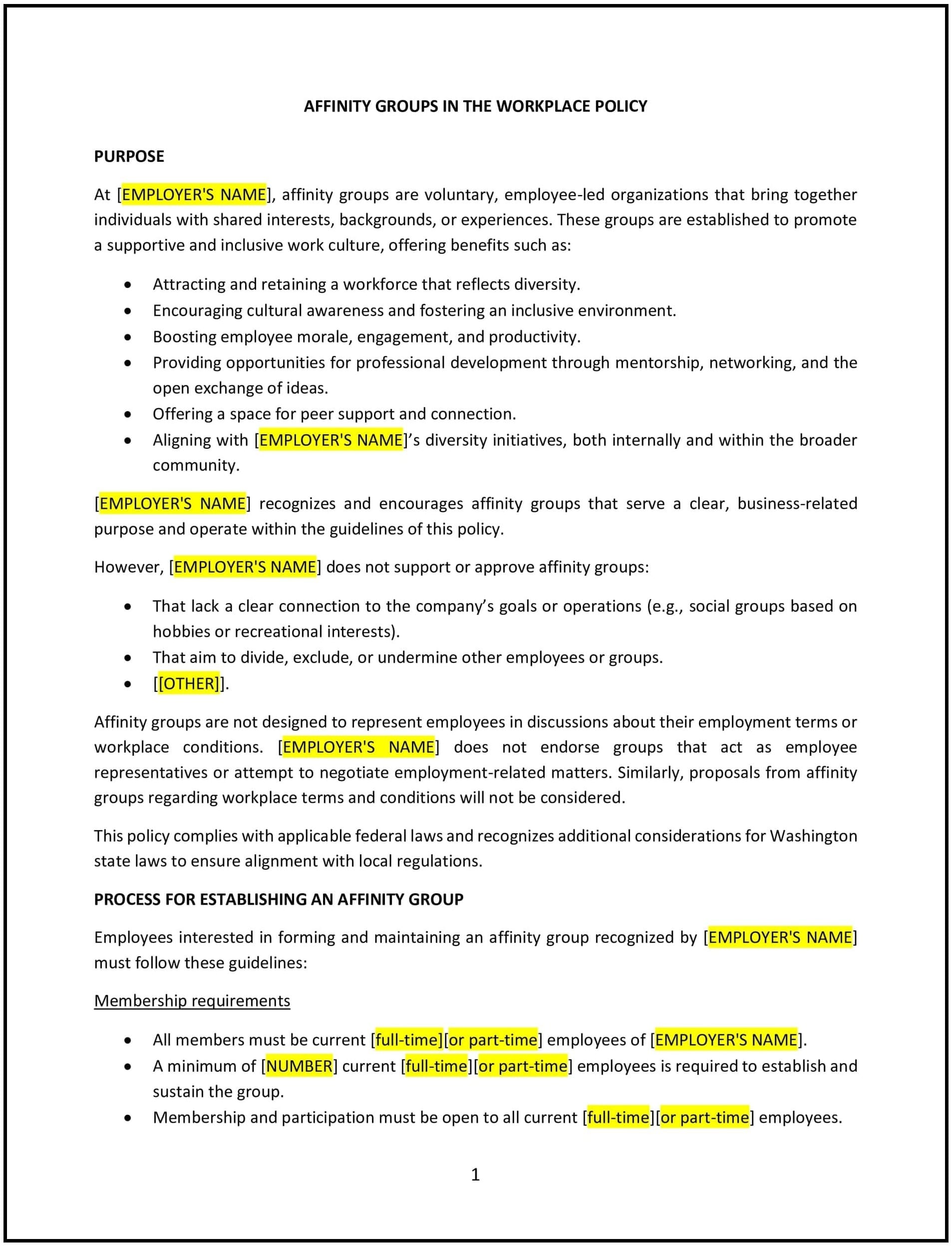Affinity groups in the workplace policy (Washington): Free template
Got contracts to review? While you're here for policies, let Cobrief make contract review effortless—start your free review now.

Customize this template for free
This affinity groups in the workplace policy is designed to help Washington businesses support the formation and operation of affinity groups, which are employee-led groups that aim to foster a sense of community and inclusion within the workplace. The policy outlines the company’s approach to supporting affinity groups while ensuring that these groups contribute positively to the workplace culture, promote diversity, and align with the company’s core values.
By adopting this policy, businesses can create an inclusive workplace, promote employee engagement, and ensure that affinity groups operate in a way that is respectful, productive, and in compliance with Washington state and federal laws.
How to use this affinity groups in the workplace policy (Washington)
- Define the purpose and scope of affinity groups: Clearly define the types of affinity groups that are supported by the company, such as groups based on shared interests, backgrounds, or professional goals. The policy should specify that the purpose of these groups is to foster community, promote diversity, and provide support for employees.
- Establish guidelines for forming affinity groups: Outline the process for employees to establish an affinity group within the company. This should include the steps for submitting a proposal, the criteria for approval, and the resources available to support the group.
- Set expectations for group activities: Affinity groups should operate within the framework of the company’s values and ensure that their activities align with business objectives and legal requirements. The policy should specify that activities should be inclusive, respectful, and non-discriminatory.
- Provide support and resources: The company should offer resources to help affinity groups succeed, such as meeting spaces, budget allocations, and access to leadership support. The policy should outline the resources available to affinity groups and the process for requesting support.
- Address participation: Employees should be encouraged to participate in affinity groups voluntarily. The policy should make it clear that participation in affinity groups is not mandatory and that employees will not be discriminated against for choosing not to participate.
- Ensure compliance with Washington and federal laws: Ensure that affinity groups operate in compliance with Washington state laws, including anti-discrimination laws, and federal regulations such as the Civil Rights Act of 1964. The policy should clarify that affinity groups must adhere to the same workplace standards and behavior as other employee activities.
- Review and update regularly: Periodically review and update the policy to ensure it remains compliant with Washington state laws, federal regulations, and any changes in the company’s operations or workplace culture.
Benefits of using this affinity groups in the workplace policy (Washington)
This policy offers several benefits for Washington businesses:
- Promotes diversity and inclusion: Affinity groups help create a more inclusive workplace by providing employees with a sense of belonging and community, which can enhance diversity and foster greater collaboration.
- Increases employee engagement: By offering employees the opportunity to participate in affinity groups, businesses can enhance employee engagement, boost morale, and improve overall job satisfaction.
- Encourages professional development: Affinity groups often provide opportunities for personal and professional growth, such as networking, mentoring, and skill-building, which can benefit both the employee and the company.
- Reduces turnover: A supportive and inclusive workplace environment, facilitated by affinity groups, can improve employee retention rates by making employees feel valued and connected to the company.
- Strengthens company culture: Affinity groups contribute to building a positive company culture by supporting shared values and creating an environment where employees feel comfortable expressing themselves and building relationships.
- Complies with legal requirements: By ensuring that affinity groups operate within the boundaries of Washington state and federal laws, businesses can avoid legal issues related to discrimination or exclusion.
Tips for using this affinity groups in the workplace policy (Washington)
- Communicate the policy clearly: Ensure that all employees are aware of the policy and understand how affinity groups are formed, supported, and expected to operate. Include the policy in the employee handbook and review it during onboarding or team meetings.
- Encourage diverse participation: Encourage employees from all backgrounds to participate in affinity groups, ensuring that these groups reflect the diversity of the workforce. This will help maximize the positive impact on company culture and foster greater collaboration.
- Provide clear guidelines for group activities: Ensure that all affinity group activities are aligned with the company’s values and do not conflict with workplace standards. The policy should clarify the expectations for group activities and behavior, ensuring that they remain respectful and inclusive.
- Offer resources and support: Provide practical resources to affinity groups, such as meeting space, budget allocations, and access to company leadership. Ensure that affinity groups are adequately supported to achieve their objectives and contribute to the company culture.
- Evaluate the effectiveness of affinity groups: Periodically evaluate the success and impact of affinity groups on the company’s culture, employee engagement, and business objectives. Gather feedback from group members and non-members to assess the value of the groups and identify areas for improvement.
- Review and update regularly: Periodically review the policy to ensure it remains compliant with Washington state laws, federal regulations, and any changes in the company’s operations or workplace culture. Regular updates will help maintain the effectiveness and relevance of the policy.